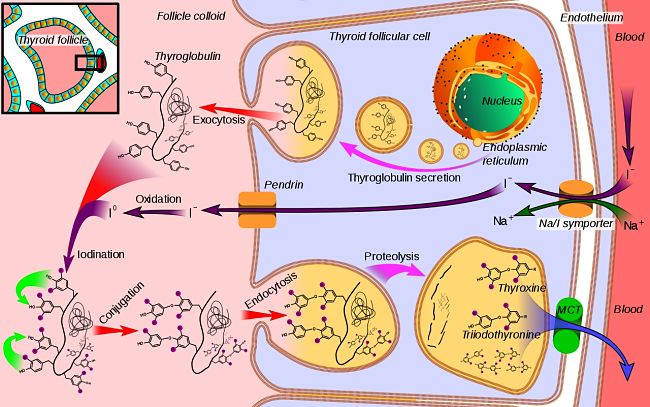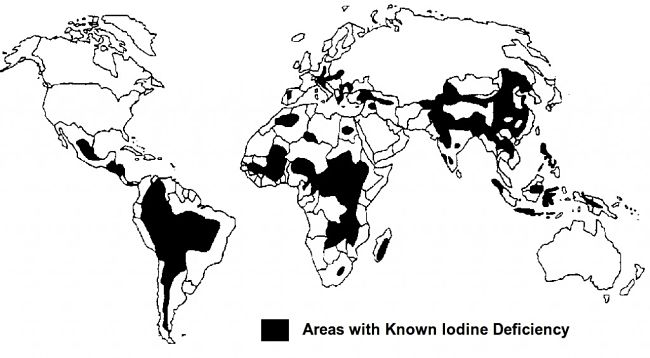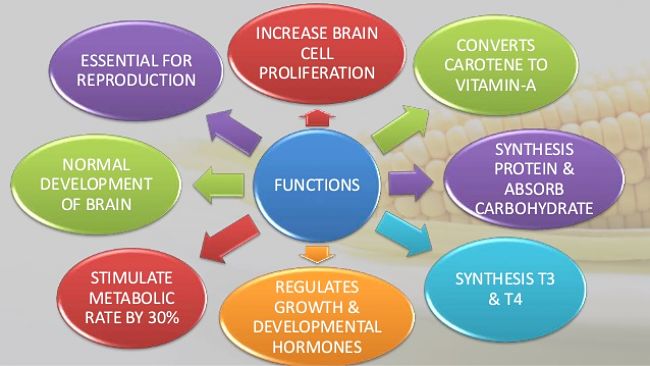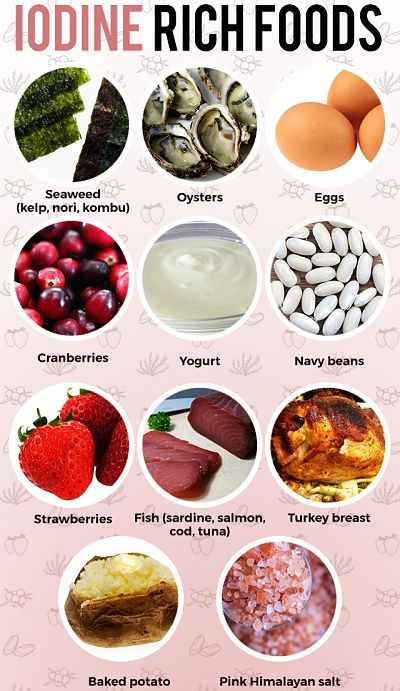Iodine Deficiency Symptoms - Impact on Babies and IQ of children
Iodine is an essential nutrient element that is critically required for the body to produce the thyroid hormone. Iodine deficiency can lead to the enlargement of the thyroid gland and to mental retardation in children whose mothers consumed inadequate iodine during pregnancy.
Prior to 1930 iodine deficiency was common in certain parts of Canada, USA, Britain and other countries. The addition of iodine to common salt has improved the situated in developed countries.
There is also greater awareness of the problem and how to prevent iodine deficiency symptoms by eating food that naturally contain iodine, such as dairy products, seafood and soy products.
However the problem remains in less developed countries and about 40% of the world's population remains at risk for iodine deficiency.
Despite the progress that has been made, women in the UK have been warned recently, that even mild iodine deficiency during pregnancy could be reducing the intellectual capacity of their babies.
Recent research, that included 1,000 families, found a correlation between lower IQ's and reading score for primary school children whose mother had insufficient iodine while pregnant.
About two thirds of the women tested had iodine deficiencies during their pregnancies.
This article discusses this research and highlights the recommended amount of iodine required every day and the best natural dietary sources of iodine.
The researchers have advised women of child-bearing age to check and make sure that they maintain adequate iodine levels in their diets by eating dairy products, soy products, fish and other natural sources of iodine.
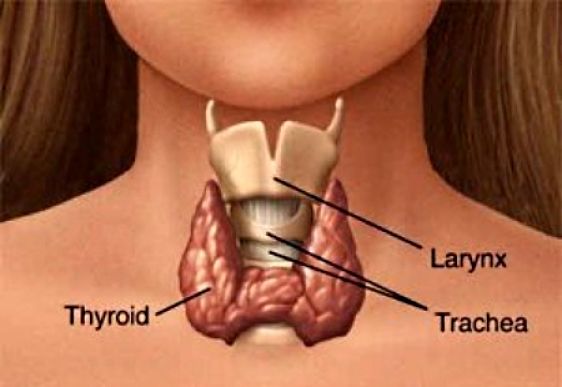
Iodine Needs, Deficiencies and How Deficiencies are Diagnosed
The best way to determine whether you have any iodine deficiency is to have a urine test.
The recommended intake of Iodine for various ages and genders are:
1 - 8 years boys and girls # 90 micro g/day
9 - 13 years boys and girls #120 micro g/day
14-18 years boys and girls # 150 micro g/day
19 - 70 years men # 150 micro g/day
19- 70 years women # 150 micro g/day
Women During Pregnancy # 220 micro g/day
Women During Lactation # 270 micro g/day
The table below summarizes the various levels of iodine decificincy and how it relates to levels of iodine in the urine and associated dietary intakes of iodine.
Foods Rich in Dietary Iodine
(see Details in table Below)
Dairy Products
- Cow's milk
- Cheese
- Yogurt
- Frozen Yogurt
- Ice Cream
Eggs
Supplements
- Iodine-containing multivitamins
- Iodized table salt
Seafood
- Saltwater fish
- Shellfish
- Seaweed (including kelp, dulce, nori)
Soy Products
- Soy milk
- Soy sauce
Research on Iodine Deficiencies in Pregnant Women in UK
Children of women with an iodine-to-creatinine ratio of less than 150 micro g/g (urine Iodine concentrations less than about 100 micro g/l) had:
Lower IQs at the age of eight
Worse reading ability aged nine.
The study suggested that iodine deficiencies during pregnancy may produce risks that a child may not reach their full potential.
What Levels of Iodine Intake Causes Known Deficiencies?
Iodine Intake Requirements and Deficiency Status
|
Median Iodine Level in the Urine
|
Iodine Intake to Maintain Urine Level Specified
|
Iodine Deficiency Status
|
|---|---|---|
|
Recommended Level in Urine - greater than 100 micro g/l
|
Recommended Dietary Allowance for iodine in adult men and women is 150 micro g per day
|
|
|
less than 20 micro g/l
|
less than 30 micro g/ day
|
Severe deficiency
|
|
20-49 micro g/l
|
30-74 micro g/ day
|
Moderate deficiency
|
|
50-99 micro g/l
|
75-149 micro g/ day
|
Mild deficiency
|
|
100-199 micro g/l
|
150-299 micro g/ day
|
Optimal
|
|
200-299 micro g/l
|
300-449 micro g/ day
|
More than adequate
|
|
more than 299 micro g/l
|
more than 449 micro g/ day
|
Possibly Excessive with Overdose Symptoms
|
Iodine Levels in Common Foods per Typical Serving or 100g
|
Food
|
Serving Size
|
Average iodine content per serving (micro g)
|
|---|---|---|
|
Oysters
|
100g
|
160
|
|
White fish
|
100g
|
115
|
|
Sushi (containing seaweed)
|
100g
|
92
|
|
Shellfish
|
100g
|
90
|
|
Yoghurt
|
150g
|
75
|
|
Cow's milk
|
200ml
|
65
|
|
Tinned salmon
|
100g
|
60
|
|
Oily fish
|
100g
|
50
|
|
Bread (made with iodised salt)
|
100g
|
46
|
|
Organic cow's milk
|
200ml
|
45
|
|
Steamed snapper
|
100g
|
40
|
|
Cheddar cheese
|
100g
|
23
|
|
Eggs
|
100g
|
22
|
|
Ice cream
|
100g
|
21
|
|
Eggs
|
1 egg (50g)
|
20
|
|
Chocolate milk
|
100g
|
20
|
|
Flavoured Yoghurt
|
100g
|
16
|
|
Cheese
|
40g
|
15
|
|
Regular milk
|
100g
|
13
|
|
Meat
|
100g
|
10
|
|
Poultry
|
100g
|
10
|
|
Canned tuna
|
100g
|
10
|
|
Nuts
|
25g
|
5
|
|
Bread
|
1 slice (36g)
|
5
|
|
Fruit and veg
|
1 portion (80g)
|
3
|
|
Bread (without iodised salt)
|
100g
|
3
|
|
Beef, pork, lamb
|
100g
|
1
|
|
Apples, oranges, grapes, bananas
|
100g
|
1
|
Related Articles
=> Bought Baby Foods Less Nutritious than Homemade and Trigger Early Weaning
=> Co-Sleeping with Baby - New Warnings on Risks, Dangers and Precautions Required
=> Q&A: Baby Jet Lag Symptoms, Remedies and Tips to Avoid It
=> When Do Babies Smile, What Baby Laughter Reveals on Thought
=> Are Dummies, Pacifiers and Soothers Good or Bad for Babies?
=> Proven Benefits of Breastfeeding for Both Mum and Baby
